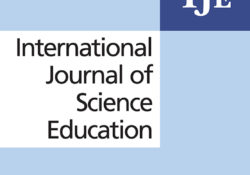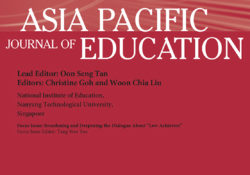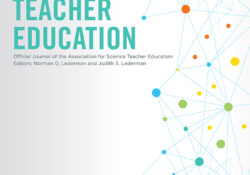
tandfonline.com har udgivet en rapport under søgningen “Teacher Education Mathematics”: ABSTRACT ABSTRACT Successful use of ICT in the classroom requires thoughtful integration of technology and pedagogical processes during lesson preparation. This study investigated whether the information format of technological and pedagogical support affects pre-service teachers’ technology integration in lesson plans. One group of pre-service teachers (n = 37) received support materials that presented technological, pedagogical and content information separately; another group (n = 36) received a version of these materials in which the technological and pedagogical information was integrated. Pre-service teachers used these support materials to create a technology-infused lesson plan. As expected, the pre-service teachers who received integrated support had relatively more design justifications in which technology and pedagogy were combined than their peers from the separate support group.… Continue Reading →
Like this:
Like Loading...
eric.ed.gov har udgivet: Teacher preparation curriculum at Technion–Israel Institute of Technology (Israel) includes courses intended to bridge the gap between the pure mathematics courses and those in psychology. The focus of this paper is an experimental program for one of these courses and data collected while implementing it. This is a second report on a naturalistic study in which mathematical paradoxes were used in the preservice education of high school mathematics teachers. The potential of paradoxes was tested for improving student-teachers’ mathematical concepts and raising students pedagogical awareness of the role of falacious reasoning in the development of mathematical knowledge. Discussions include the psychological and mathematical background, the experimental courses and data collection procedures, the students, and findings. Examples of paradoxes are given. Included are 36 references. (DC) Link til… Continue Reading →
Like this:
Like Loading...
eric.ed.gov har udgivet: To extend current understanding of school-based agriculture teacher development, this study explored the relationship between teacher development experiences and the self-efficacy of early career agriculture teachers. Three teacher development experiences were of interest: (a) preservice coursework, (b) student teaching, and (c) professional development. Teacher development experiences were analyzed in relation to classroom management self-efficacy, instructional strategies self-efficacy, leadership self-efficacy, science teaching self-efficacy, and math teaching self-efficacy. The relationships between development experiences and self-efficacy were analyzed through five linear regressions with teacher development experiences as independent variables and the five areas of self-efficacy as separate dependent variables. Only statistically insignificant relationships were identified for classroom management self-efficacy and instructional strategies self-efficacy. Student teaching and professional development were statistically significant, positive predictors of leadership self-efficacy. Professional development was also… Continue Reading →
Like this:
Like Loading...
tandfonline.com har udgivet en rapport under søgningen “Teacher Education Mathematics”: ABSTRACT ABSTRACT Although microteaching is a common approach to engaging preservice teachers in reflection on teaching in on-campus courses, this reflection is usually carried out as a separate part. We examined how preservice middle school science teachers reflected amid planning a 20-min microteaching unit on sustainable development. Six groups of preservice teachers were video recorded and their conversations transcribed. We used practical epistemology analysis to analyze moments of reflection in these conversations. The preservice science teachers recurrently engaged in reflection in the course of their planning, which led to changes in perspective concerning important aspects of how to plan teaching that may be considered central for preservice science teachers to learn during their teacher education. Preservice teachers’ reflection was related… Continue Reading →
Like this:
Like Loading...
tandfonline.com har udgivet en rapport under søgningen “Teacher Education Mathematics”: ABSTRACT ABSTRACT Today teachers and their professional knowledge base have become important, since knowledge has become a pivotal aspect of modern society. This study investigates the shaping of pre-service teachers’ knowledge base by studying the assessment practice in teacher education programmes for primary level teachers. The analytical focus lies on pedagogic discourses and what skills and competencies are legitimized in and through the assessment tasks. The results show that Swedish primary school pre-service teachers are primarily trained to work with subject didactics, and focus is placed on being able to plan, carry out, and evaluate teaching in light of descriptive and normative learning theories, as well as the current curricula. One possible effect of this strong subject didactic focus is… Continue Reading →
Like this:
Like Loading...

tandfonline.com har udgivet en rapport under søgningen “Teacher Education Mathematics”: ABSTRACT ABSTRACT According to international benchmarks [Thomson, S., Wernert, N., O’Grady, E., & Rodrigues, S. (2017). TIMSS 2015: Reporting Australia’s results. Retrieved from Camberwell, Victoria: www.acer.edu.au/timss], Australia’s science education is still in decline and so the need for further investigation into preservice teachers is warranted. Utilising data from a broader mixed methods doctoral study [Norris, C. M. (2017). Exploring the impact of postgraduate preservice primary science education on students’ self-efficacy. Retrieved from http://ro.ecu.edu.au/theses/2040], this paper investigates the type of science learner entering into postgraduate preservice primary teacher education and how different learner types influence teacher self-efficacy and their effectiveness to teach science [Bleicher, R. (2009). Variable relationships among different science learners in elementary science-methods courses. International Journal of Science and Mathematics Education, 7(2),… Continue Reading →
Like this:
Like Loading...
eric.ed.gov har udgivet: Questioning techniques have historically been considered the measurement by which teachers challenge and gauge student learning. Much has been said about questioning strategies used by teachers; yet little is known about the strategies used by pre-service teachers, especially those that are working with English language learners. This study presents findings from a qualitative study that explored what types of questions pre-service teachers use and their reflections on the use of such strategies. Eight bilingual/ESL pre-service teachers in South Texas were videotaped during a math and a language arts lesson, attended focus groups, and participated in an exit interview. The findings revealed the type of questions used by the participants, how they made sense of their teaching, and how accountability measures influenced their teaching. This research recommends education… Continue Reading →
Like this:
Like Loading...

tandfonline.com har udgivet en rapport under søgningen “Teacher Education Mathematics”: ABSTRACT ABSTRACT Inclusive education (IE) has the potential to improve special education needs (SEN) students’ learning outcomes, but IE requires teachers receive adequate training to be effective. We introduce an approach to pre-service teacher preparation using experiential learning in an informal learning environment to educate beginning teachers about effective science teaching for SEN students. Using data collected from observations, survey, interviews, and autobiographical reflections, we explored how teachers’ engagement in an informal teaching experience impacted their perceptions about SEN students, their beliefs about the value of teaching science to SEN students, and their beliefs about their future responsibilities to support SEN students in inclusive classrooms. Findings expand our understanding of how to prepare new science teachers to improve science learning… Continue Reading →
Like this:
Like Loading...
eric.ed.gov har udgivet: Following a high-quality early care and pre-K experience, the kindergarten-through-third-grade years set the foundation upon which future learning builds; and strengthening this continuum creates opportunities for later success. Key components of a quality experience in K-3 include school readiness and transitions, kindergarten requirements, educator quality, prevention, intervention and assessments, and social and emotional learning and mental health. Education Commission of the States researched the policies and regulations that guide these key components in all 50 states to provide this comprehensive resource and many others. The data in this document show at least 20 states require some form of math knowledge for pre-service teacher candidates. Five additional states only require professional development in math for in-service teachers, with three states having requirements for both teacher candidates and current… Continue Reading →
Like this:
Like Loading...
eric.ed.gov har udgivet: During the last reform, Slovakia has reduced geometry in curriculum in primary mathematics education. Pre-school education schools devote more time to geometry in curriculum, but this is not mandatory for all the children. In the primary schools, teachers devote very little lessons time to this problem. These lessons are mainly focused on technology of drawing rather than on creating the right conceptions, which results in below the average scores on international test results in Slovak students. One possible solutions is to improve the level of geometrical knowledge of primary education teachers and pre-service primary education teachers. This paper is focused on the knowledge of plane geometric figures and their properties. We found out that pre-service teachers in primary education have many misconceptions that started when these students… Continue Reading →
Like this:
Like Loading...




